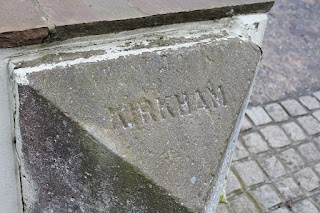Pictures of a very substantial milestone. This is very large, made of concrete, and cemented to someone's wall. It is also halfway up the rise of the "back" road into Kirkham. About 250 yards from the Dowbridge on the right hand side, opposite Glebe Lane. This milestone is documented on the Milestone Society database.
Half a mile from the Dowbridge cross .
Here are the Pictures:
Half a mile from the Dowbridge cross .
Here are the Pictures:
 |
| Preston 7 3/4 Miles |
 |
| Kirkham |
 | |
| I think it says? Kirkham ?/? Mile? (possibly 3/4 - that would be about right) Blackpool 10 Miles |
 |
| It is steep, but not quite as steep as the photo suggests. Holding the wall up! |
 |
| Not sure about this. On the opposite side of the road and considerably smaller than any of the chunky stone milestones locally. |


